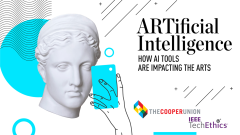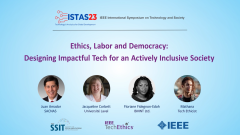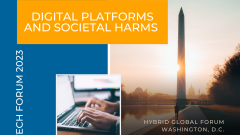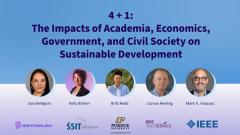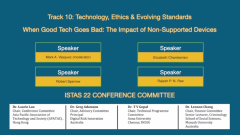Mind/Brain Research and AI Development: How Do They Inform Each Other? - IEEE TechEthics Panel
About this Talk: This panel explores the relationship between brain research and artificial intelligence advancements, including the social and ethical implications of building machines that think like humans.
About the Speakers: Stephanie J. Bird, PhD (moderator) is a laboratory-trained neuroscientist whose professional interests are two-fold: the ethical, legal and social policy implications of scientific research, especially neuroscience; and education in the responsible conduct of research and the professional responsibilities of scientists and engineers. As an independent consultant she works with institutions of higher learning, professional societies, government agencies, and law firms in the United States and other countries. In addition, Dr. Bird is co-Editor-in-Chief of Science and Engineering Ethics, an international publication that explores ethical issues of concern to scientists and engineers. Now in its 23rd year, the journal is widely abstracted and indexed and has been cited by the National Academies as a leading resource for scholarly articles on research integrity.
Dr. David Danks is the L.L. Thurstone Professor of Philosophy and Psychology and the head of the department of Philosophy at Carnegie Mellon University. His research largely falls at the intersection of philosophy, cognitive science, and machine learning, using ideas and frameworks from each to inform the others. His primary research in recent years has been in computational cognitive science: developing fully-specified computational models to describe, predict, and most importantly, explain human behavior. His other major research project, partly supported by an Andrew Carnegie Fellowship, has focused on the human impacts when autonomy is introduced into a technological system. In particular, he has examined the relations of trust and identity as they are affected by technologies such as self-driving vehicles, autonomous weapons systems, and autonomous cyber-systems.
Eleonore Pauwels is a writer and international science policy expert, who specializes in the governance of emerging and converging technologies. At the Wilson Center, she is the Director of Biology Collectives, within the Science and Technology Innovation Program. Her research focuses on the convergence of transformative technologies such as artificial intelligence, genome-editing, digital bio-engineering and automation technologies. She analyzes the promises and perils that will likely arise with the development of the Internet of Living Things and future networks of intelligent and connected bio-labs. Her work also fosters the democratization of disruptive health technologies, including AI and genomics, and the inclusion of patients and citizens through participatory health design (her Citizen Health Innovators Project). Eleonore regularly testifies before U.S. and European authorities including the U.S. Department of State, NAS, NIH, NCI, FDA, the National Intelligence Council, the European Commission and the UN. But she is also well-versed in communicating complex and novel scientific developments for lay audiences (her TEDxCERN on CRISPR) and her writing has been featured in media outlets such as Nature, The New York Times, The Guardian, Scientific American, Le Monde, Slate and The Miami Herald.
Dr. Michael Wolmetz is a Senior Scientist at the Johns Hopkins University Applied Physics Laboratory (JHU/APL) Intelligent Systems Center, where he leads several research teams integrating psychological and brain sciences with research and development in machine learning, robotics, and human-machine interaction. His primary research focus is on how the mind and brain process information during language comprehension and communication, and whether basic science in these areas can be translated into applications to enhance defense, intelligence and clinical practices. He currently serves on the JHU Science of Learning Institute steering committee, and his work is supported by the Intelligence Advanced Research Projects Activity (IARPA), the US Department of Defense, Facebook, and others.
Recorded at the IEEE TechEthics Conference, held on 13 October 2017 at the National Academy of Sciences Building in Washington, DC. The conference was made possible in part by a grant from the IEEE Foundation. Special thanks to the National Academy of Engineering.
About this Talk: This panel explores the relationship between brain research and artificial intelligence advancements, including the social and ethical implications of building machines that think like humans.
 Cart
Cart Create Account
Create Account Sign In
Sign In
